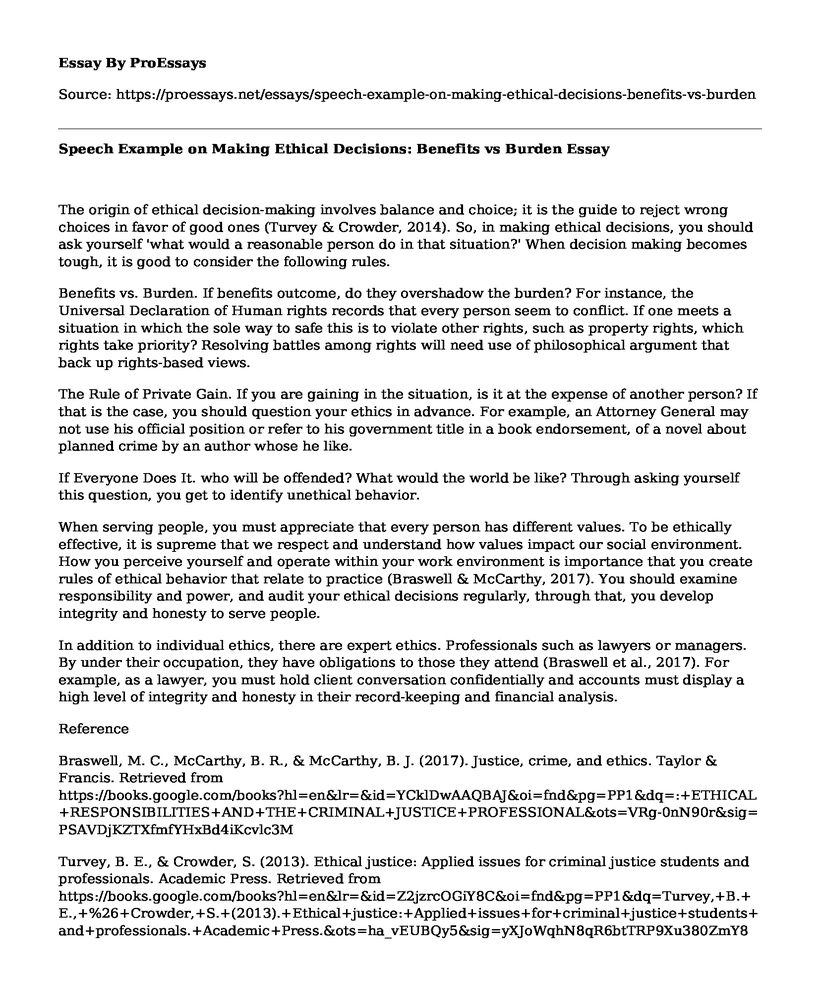The origin of ethical decision-making involves balance and choice; it is the guide to reject wrong choices in favor of good ones (Turvey & Crowder, 2014). So, in making ethical decisions, you should ask yourself 'what would a reasonable person do in that situation?' When decision making becomes tough, it is good to consider the following rules.
Benefits vs. Burden. If benefits outcome, do they overshadow the burden? For instance, the Universal Declaration of Human rights records that every person seem to conflict. If one meets a situation in which the sole way to safe this is to violate other rights, such as property rights, which rights take priority? Resolving battles among rights will need use of philosophical argument that back up rights-based views.
The Rule of Private Gain. If you are gaining in the situation, is it at the expense of another person? If that is the case, you should question your ethics in advance. For example, an Attorney General may not use his official position or refer to his government title in a book endorsement, of a novel about planned crime by an author whose he like.
If Everyone Does It. who will be offended? What would the world be like? Through asking yourself this question, you get to identify unethical behavior.
When serving people, you must appreciate that every person has different values. To be ethically effective, it is supreme that we respect and understand how values impact our social environment. How you perceive yourself and operate within your work environment is importance that you create rules of ethical behavior that relate to practice (Braswell & McCarthy, 2017). You should examine responsibility and power, and audit your ethical decisions regularly, through that, you develop integrity and honesty to serve people.
In addition to individual ethics, there are expert ethics. Professionals such as lawyers or managers. By under their occupation, they have obligations to those they attend (Braswell et al., 2017). For example, as a lawyer, you must hold client conversation confidentially and accounts must display a high level of integrity and honesty in their record-keeping and financial analysis.
Reference
Braswell, M. C., McCarthy, B. R., & McCarthy, B. J. (2017). Justice, crime, and ethics. Taylor & Francis. Retrieved from https://books.google.com/books?hl=en&lr=&id=YCklDwAAQBAJ&oi=fnd&pg=PP1&dq=:+ETHICAL+RESPONSIBILITIES+AND+THE+CRIMINAL+JUSTICE+PROFESSIONAL&ots=VRg-0nN90r&sig=PSAVDjKZTXfmfYHxBd4iKcvlc3M
Turvey, B. E., & Crowder, S. (2013). Ethical justice: Applied issues for criminal justice students and professionals. Academic Press. Retrieved from https://books.google.com/books?hl=en&lr=&id=Z2jzrcOGiY8C&oi=fnd&pg=PP1&dq=Turvey,+B.+E.,+%26+Crowder,+S.+(2013).+Ethical+justice:+Applied+issues+for+criminal+justice+students+and+professionals.+Academic+Press.&ots=ha_vEUBQy5&sig=yXJoWqhN8qR6btTRP9Xu380ZmY8
Cite this page
Speech Example on Making Ethical Decisions: Benefits vs Burden. (2023, Mar 10). Retrieved from https://proessays.net/essays/speech-example-on-making-ethical-decisions-benefits-vs-burden
If you are the original author of this essay and no longer wish to have it published on the ProEssays website, please click below to request its removal:
- Interpersonal Conflict in Big Bang Film Essay Example
- Essay on Grandmothers as Primary Caregivers: African-American and Other Communities
- Research Paper on Gender Stereotypes: Separating Society and Creating Gender Gaps
- Essay Example on Internet Activism: Leveraging Social Media for Social Change
- Paper on Grandma and Me: Baking Our Way to Connection
- Free Essay Sample on Activism and Populism
- Essay on Confucius' Enduring Legacy: Examining the Benefits of Traditional Rites on Individuals and Communities







